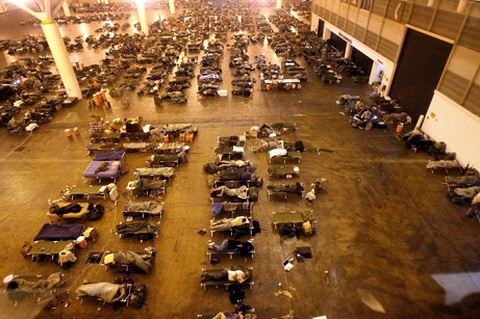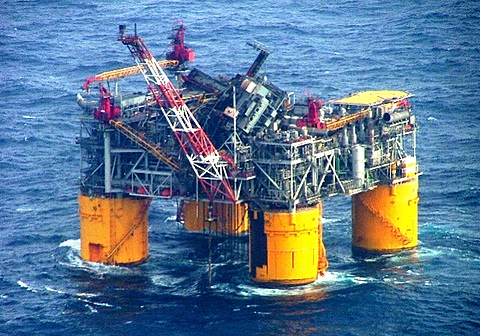POSTED: 8 SEPTEMBER 2008 - 7:30am EST
Hurricane Gustav
update

image above: Louisiana National Guard resting at Morial
Hall on 9/1/08. by National Geographic
Coup
de Grace: Grid down & many turned back at checkpoints
|
POSTED: 3 SEPTEMBER 2008 - 7:30am EST
Gustav slams
Gulf oil facilities

image above: Mars natural gas platform
damaged in huuricane Katrina
| Hurricane destroys oil infrastructure; oil price falls By Richard Heinlberg on 2 September 2008 in www.postcarbon.org Sometimes you just have to stand in awe and wonder before the all-knowing wisdom of The Market. Common sense would say: Hurricane Gustav (even considering the fact that it never achieved its advertised category 4 status before landfall) is likely to result in 40% of US Gulf of Mexico oil production being taken off-line for 30 days, with longer outages for some rigs, terminals, and refineries; therefore, given the fact that fuel supplies in the US are already tight, this is a good time to load up on oil futures. But Noooooo. That’s not how the market works. Because the expectation of storm damage was higher, Monday’s trading was actually dominated by a sell-off. This tells us just how important the market and price signals are in helping us prepare for the inevitable decline in world oil production. To wit: not very. When the oil price was above $140 and commentators were forecasting a continuing spike up past $200, it was easy for Peak Oilers to feel vindicated and to hop on board the giddy Ferris wheel ride. Newspapers, television, NPR—everyone was talking about Peak Oil. But now as the oil price drifts toward $110 or maybe $100—even though this is still a historically high price range—the excitement is over. Page views on Peak Oil websites have fallen. All that talk of the party being over was just so much scaremongering. The price of oil is a single number. The media want information that can be summarized in a short phrase. But reality is complicated. World oil supply is only understandable in terms of the production histories of dozens of countries, thousands of oil fields, and decades of trends in discovery and depletion. Moral of the story: In the task of waking humanity up to the plight of resource depletion, the market is not very helpful, even if it occasionally does give useful warning signs. It’s a bit like the broken clock that tells perfect time twice a day. |
by James Kunstler on 1 September 2008 in www.kunstler.com This may be what finally stops the game of musical chairs in which insolvent banks pretend to be capitalized by showing up for loans at the Federal Reserve's teller cages. For instance, when last seen before the Labor Day hiatus, Lehman Brothers was desperately scrambling for life-support from anybody and anything with a few billion spare bucks. As the hiatus ends and real-life reasserts itself, Lehman may finally find
itself free-falling into the abyss, and the chain of mutual obligations, cross-collateralizations, and Ponzi plays connecting it to the other banks could break, bringing on a domino fall of insolvent banks and institutions. Hurricane Gustave has now moved away from New Orleans and is stumbling northwest through the backwaters of louisiana toward Texas. Damage to the city of NOLA seems to be minimal at this time. But there is something very strange about coverage coming across on the cable news networks. While trumpeting the "dodged bullet" story-line, and the triumph of post-Katrina government bureaucracy, there have been absolutely no reports of what's happened to the oil-and-gas platforms offshore, the Louisiana Offshore Oil Port (LOOP), or the tangle of pipelines running along the sea floor from these things to the onshore terminals and refineries. I'm quite sure we will not get any comprehensive news about
these things for days, because it will require a huge effort of up-close inspection. |
Island Breath: Peak Global Economy 7/29/08
Island Breath: Fannie Mae & Freddie Mac Mess 7/14/08
Island Breath: The Perfect $torm Approaches 6/28/08
Island Breath: Report from the Bank of Banks 6/28/08